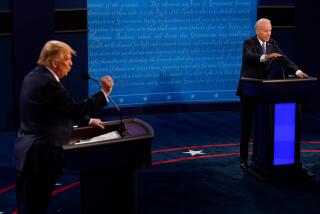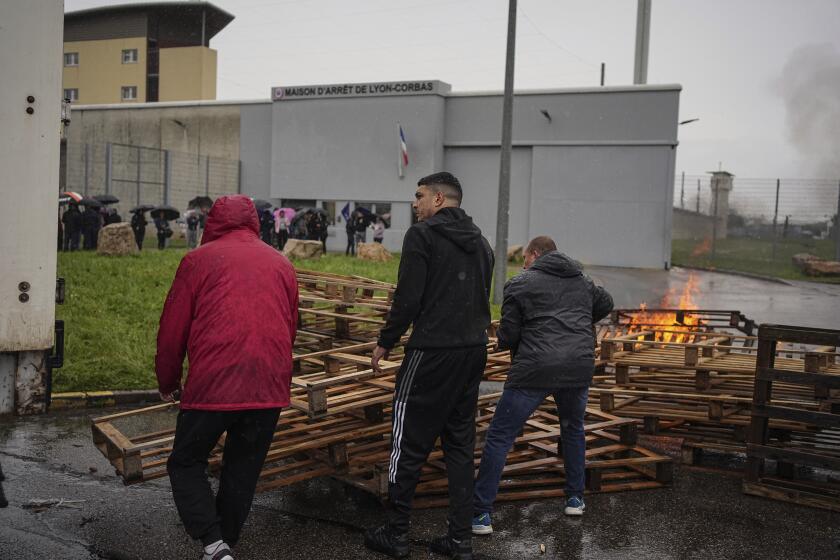Saudis Reportedly Shift Stance on Mideast Talks : Diplomacy: Five other Arab nations are also said to be ready to join peace conference, boosting Baker plan.
In a turnabout that could improve prospects for an eventual settlement of the Arab-Israeli conflict, Saudi Arabia and five other moderate Arab nations have agreed to take part in a Middle East peace conference, a Saudi diplomatic source said Friday.
The agreement by the members of the Gulf Cooperation Council is expected to be announced today in Luxembourg and is timed to coincide with a new Middle East diplomatic tour begun Friday night by Secretary of State James A. Baker III.
In addition to Saudi Arabia, the members of the council are Kuwait, Bahrain, Qatar, the United Arab Emirates and Oman.
A Bush Administration official, while not confirming the development, said participation in a peace conference has been under renewed, private discussion between the United States and Saudi Arabia despite the Saudis’ seeming opposition.
“The initial indications from the Saudis were that they were in favor” of the plan, said the official, who spoke on condition of anonymity.
The decision by the Gulf Cooperation Council members would reverse what had been seen as a possibly fatal blow to Baker’s peace formula. When he visited Saudi Arabia on April 21, Baker was told by the Saudis to count them out of any regional peace conference involving Israel and other Arab countries.
Despite the more conciliatory stand to be announced today, Saudi Arabia and the five other members of the council are expected to impose key limits on the role they will play in a peace conference: The individual countries will send representatives to meetings on specific topics, such as arms control or water pollution. But they will be represented only by the council’s secretary general, Abdullah Bishara of Kuwait, at the broad, opening session of the peace talks rather than by their own national representatives.
The arrangement appears to be carefully crafted to satisfy the United States and Israel without alienating those holding more hard-line Arab sentiments. While Saudi Arabia and the other council members legitimately can claim to be participating in the peace conference, their government officials will be conspicuously absent when the politically explosive subject of a possible Arab-Israeli settlement is broached in the general session.
Despite the conditions, said the Saudi diplomatic source, “the goal is to get the peace process moving.”
Thus, as Baker begins his fourth journey to the region in two months, he will be able to dangle the carrot of Saudi participation in front of the Israelis in an effort to win concessions on their part.
It is not clear whether the formula being advanced by Saudi Arabia and the other members of the council would satisfy Israel, which would like to engage in direct, bilateral relations with Saudi Arabia and other estranged Arab neighbors. Egypt is alone among Arab states in maintaining diplomatic relations with Israel.
Baker has been shuttling among Washington, Arab capitals and Israel in an effort to take advantage of the regional alliance formed during the Persian Gulf War and move toward a broader cooperation involving Israel.
When Prince Saud al Faisal, the Saudi foreign minister, announced last month that his country was reluctant to take part in a peace conference--the centerpiece of Baker’s Middle East effort--the appeal of a meeting was tarnished for Israel. The Israeli government had hoped to use the session as a forum for face-to-face talks with the major nations of the Arab world.
According to a Saudi diplomatic source, who declined to be further identified, Prince Bandar ibn Sultan, the Saudi ambassador to the United States, met Tuesday with Baker and then with President Bush to discuss the prospects of bringing Saudi Arabia and the others into the talks.
The source said Bandar met in Saudi Arabia with King Fahd and the foreign minister on Wednesday. On Thursday, the source said, the other members of the Gulf Cooperation Council “came on board and agreed to commit” themselves to the limited roles in the peace conference.
Bandar was said to have reported the agreement Thursday evening to Baker and Brent Scowcroft, Bush’s national security adviser, in telephone calls from Riyadh. He then flew back to Washington and met with Baker late Friday at the State Department before the secretary left for his Middle East journey, the source said.
In another development, the source said, Soviet Foreign Minister Alexander A. Bessmertnykh, who is on a Middle East tour that includes a ground-breaking visit to Israel, was adding a stop in Saudi Arabia to meet with Fahd.
The addition was seen as a further sign of progress in the region and of the warming relations between the Soviet Union and Saudi Arabia, which severed official ties in 1938.
In a statement to be made public today, the Gulf Cooperation Council will announce that it is ready “to participate, if invited, as an observer in the forthcoming peace conference through representation by its secretary general.”
The step would be taken, the statement says, “to achieve peace, security and stability in the Middle East and in support of the peace process and current efforts to put an end to the Arab-Israeli conflict and to reach a just solution to the Palestinian question.”
The decision that the individual nations would take part in meetings on specific issues in the region was described by the Saudi source as “an attempt to get through the door in the softest possible way.” In other words, they would demonstrate a readiness to meet with Israel, without moving any closer than necessary to a formal recognition of the Jewish state.
“What this really means is not bilateral but regional discussions,” the source said. “This is an attempt to get movement. It’s not a commitment to bilateral discussions. We’re trying to signal we’re flexible and open.”
In his previous meetings with the Saudis, Baker had not given the impression that he was disappointed with their reluctance to take part in a peace conference, leaving the impression that he was content to dangle their possible participation as a reward for movement by Israel.
Throughout the two months, Baker has pressed for approval of his “two-track” approach, a plan that envisions one-on-one meetings between Israel and each of the Arab states and also between Israel and the Palestinians. He suggested it after Israel and the Palestinians were unable to agree on a procedure for direct talks.
The Israeli government of Prime Minister Yitzhak Shamir is eager to establish normal relations with Arab governments but has been unwilling to consider giving up any additional land that it has occupied since the 1967 Six-Day War in exchange for peace.
SOVIETS UPBEAT: Foreign minister visits Israel, sees hope for peace. A12
More to Read
Start your day right
Sign up for Essential California for news, features and recommendations from the L.A. Times and beyond in your inbox six days a week.
You may occasionally receive promotional content from the Los Angeles Times.






